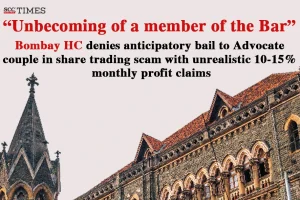Bombay High Court: In the present case, the applicants filed an application for anticipatory bail, apprehending arrest in connection with offences punishable under Sections 318(4) and 3(5) of the Bharatiya Nyaya Sanhita, 2023. The complainant alleged that the applicants persuaded him to part with a large sum of money by assuring abnormally high profits through intraday share trading. A Single Judge Bench of Amit Borkar, J., rejected the application, holding that the promise of 10 to 15 per cent monthly profit was unrealistic and impractical, as no genuine business could yield such returns. The Court emphasised that such inducement reflected dishonest intention at inception, and the assurance of guaranteed profit showed that the applicants were not conducting a lawful business but were luring the informant with false promises for financial gain.
Background:
In May 2024, the complainant and Applicant 2 started a law partnership firm and executed a formal deed in July 2024. The applicants (Applicants 1 and 2) later informed the complainant that they were engaged in intraday share trading and persuaded him to invest Rs 30 lakhs in cash, promising monthly profits of 10 per cent to 15 per cent. Applicant 1 was the wife of Applicant 2 and was actively involved in the trading activity.
Initially, the applicants paid Rs 4 lakhs as profit and handed over a cheque of Rs 25 lakhs as security. Later, Rs 10 lakhs was transferred to the complainant, but he returned it, demanding full repayment. Despite repeated assurances, the applicants failed to repay the full amount. When the complainant sent his servant to collect the money, the applicants allegedly abused him. The complainant stopped payment on the security cheque and initiated proceedings under the under Sections 138 and 142 of the Negotiable Instruments Act, 1881. He also alleged threats during a visit to the applicants’ office and lodged a police complaint.
The applicants argued that the FIR was false and motivated by professional rivalry. They claimed to have paid Rs 36.32 lakhs to the complainant and stated that the investment was made with full awareness of risks. They maintained that the dispute was civil in nature and sought protection from arrest.
The complainant presented transcripts and a draft agreement showing admission of money receipt. Investigation revealed similar complaints from four other individuals, involving large sums and false promises of high profits. It was argued that custodial interrogation was necessary to trace fund usage, and anticipatory bail was opposed.
Analysis and Decision:
The Court examined the FIR, documents, and investigation papers and observed that the allegations could not be brushed aside as mere breach of contract or non-performance of a partnership agreement. The Court emphasised that the case went beyond civil liability, as the applicants, from the beginning, persuaded the informant to part with a large sum on the assurance of abnormally high profits through intraday trading.
The Court highlighted that the promise of 10 per cent to 15 per cent monthly profit was unrealistic and impractical, as no genuine business could yield such returns, since such inducement reflected dishonest intention at inception, and the assurance of guaranteed profit showed the applicants were not conducting a lawful business but luring the informant with false promises for financial gain. The Court observed that where inducement was coupled with an impossible assurance, the offence of cheating arose. However, a conclusive finding was not necessary at this stage, but the allegations disclosed ingredients of a criminal offence, hence, the plea that the dispute was civil in nature could not be accepted.
The Court emphasised that both parties were practicing advocates and had constituted a partnership firm under the name Law Sinergy, where the record showed that Applicant 2 issued a notice to the informant stating that Rs 26.32 lakhs had been paid for “liaisoning work” with the Revenue Commissioner and Minister. The Court noted that such transactions by advocates directly reflected on their professional conduct, as the Advocates Act, 1961, under Section 35, envisaged disciplinary action for misconduct and engaging in influence peddling or liaisoning for monetary gain was unethical and could amount to professional misconduct.
While considering anticipatory bail, the Court could not ignore the professional status of the parties and the nature of admitted dealings. The Court noted that the very fact that an advocate had issued a notice admitting payment of more than Rs 26 lakhs for liaisoning with revenue authorities indicates conduct which was prima facie unbecoming of a member of the Bar. The Court further observed that such conduct strengthened the prosecution case that the applicants were acting with dishonest intention and misused their professional status to secure confidence of the informant and others for monetary gain.
The Court highlighted that four others had made similar allegations, showing the activity was part of a larger scheme and the argument that the complainant knowingly invested with risk awareness did not absolve the applicants when the inducement was based on false assurance. Thus, the Court held that dishonest intention could not be ruled out.
The Court, therefore, considering the magnitude of the amounts involved, the number of victims, and the necessity of ascertaining the utilisation of funds, held that custodial interrogation of the applicants was necessary and that the grant of anticipatory bail at this stage was likely to hamper the investigation. The Court found no merit in the application and rejected the application for anticipatory bail. Consequently, the Court rejected the request for continuation of interim relief sought by the applicants.
[Rupali Bapurao Jadhav v. State of Maharashtra, 2025 SCC OnLine Bom 3197, decided on 17-09-2025]
Advocates who appeared in this case:
For the Applicants: Shailesh Kharat with Bharat Shinde, Sumitkumar Nimbalkar, Parthraj Ware, Neha Rathod i/by Govind Mundhe
For the Respondents: Mahalakshmi Ganapathy, APP, Chaitanya Pendse i/by Rohan Hogle

